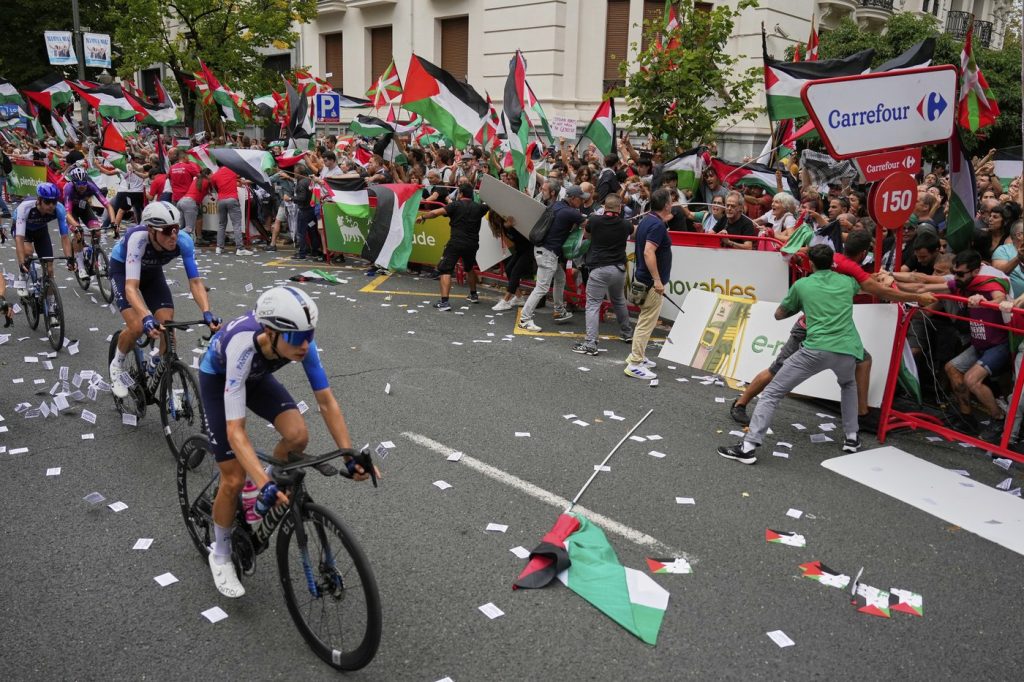BARCELONA, Spain – In a quiet village in northwestern Spain, Rosana Prieto, an alderperson, found a unique opportunity to amplify her community's voice amidst one of the world's most significant cycling races. As protesters gathered during the Spanish Vuelta, Prieto and others took to the roads, displaying Palestinian flags to condemn Israel's ongoing military operations in Gaza, a movement heightened by recent geopolitical tensions.
Strategically located at a crucial bend just before the finish line of the 15th stage, these townspeople aimed to capture global media attention. However, as a demonstration unfolded further up the race route, a protester inadvertently caused a crash among competitors when they ventured too close to the speeding cyclists.
Protests at the Vuelta, Spain's equivalent of the Tour de France, have turned increasingly vocal and disruptive, with hundreds taking to the streets to express their sentiments regarding the Israeli-Palestinian conflict. Over the course of the event, five out of ten days of racing have faced interruptions, resulting in over 20 detentions by law enforcement.
The backdrop of these protests stems from Israel's extensive military operations in Palestinian territories, a response to Hamas's deadly attack on October 7, 2023. Many Spaniards, energized by their left-leaning government's vocal opposition, have turned their anger towards Israel. The protests during the Vuelta have gained tacit governmental support, pushing Spain to adopt one of the most critical stances against Israel among European nations amidst this prolonged military campaign.
Prieto expressed the essence of the protests, stating, "The protests were born from the idea that our only chance to defend human rights regarding Israel is the Spanish Vuelta. It is an international spotlight for us to say that we are against what Israel is doing."
In response, Israel has staunchly defended its actions, claiming the protests represent a misguided alliance with Hamas. With casualties in Gaza exceeding 64,700, according to health ministry reports, the humanitarian crisis continues to escalate.
Government Response and Pressure
Spain's Prime Minister Pedro Sánchez has previously joined Ireland and Norway in recognizing a Palestinian state and has even taken steps to support South Africa’s case accusing Israel of genocide at the U.N. The convergence of protests and political actions reflects a deeper societal discontent in Spain regarding the conflict.
Protesters argue that if international sports have banned Russian teams over the Ukraine war, similar actions should apply to Israeli teams. The Spanish government concurs, with Foreign Minister José Manuel Albares advocating for the expulsion of the Israeli-owned team from the race due to the ongoing crisis in Gaza.
Such sentiments have prompted remarks from government officials like Pilar Alegría. She stated, “Sports cannot be isolated from the world that surrounds them,” acknowledging the intertwining of sports and socio-political issues.
However, the protests have also raised concerns about safety among cyclists. Security measures during the Vuelta have struggled to address the uncontainable nature of the protests, with demonstrators jumping out from the woods to impede cyclists, resulting in two crashes—though neither involved members of the Israeli team. Some cyclists voiced their apprehensions, indicating a readiness to withdraw from the race should their safety be compromised further.
Controversy and International Relations
As tensions continue, the Israeli Premier Tech cycling team, under fire for its connection to the conflict, has attempted to maintain a low profile by removing identifying names from their uniforms. The team is owned by Sylvan Adams, a Canadian businessman who has promoted Israel through global sporting events, reflecting the intertwining of sports with national identity and politics.
The team’s performance amidst protests has garnered support from Israeli officials, with Prime Minister Benjamin Netanyahu praising them for resilience against what he termed "hate and intimidation."
Protests during the Vuelta mark a significant moment in Spain's political narrative regarding the Israeli-Palestinian conflict, coming alongside broader public anger over the humanitarian crisis in Gaza. Prime Minister Sánchez’s labeling of Israeli actions as "genocide" has further fueled diplomatic disputes, causing tensions to surface between Spain and Israel, with accusations of antisemitism directed at the Spanish government.
As the final stage of the Spanish Vuelta approaches, demonstrators are expected to take to the streets once more. Authorities are preparing by deploying an additional 1,500 police officers to ensure safety during an event that has now become a poignant dissection of sport, politics, and public sentiment.











